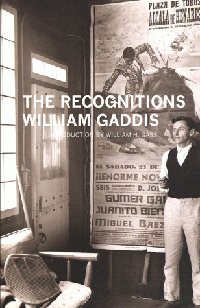HIS STACK OF PALIMPSESTS
on reviewing Gaddis’s The Recognitions1
 The Recognitions
The Recognitions
by William Gaddis
Reissued by Dalkey Archive, 2012
976 pages / $18.95 Buy from Dalkey Archive or Amazon
(Download PDF Version of Review)
| “Of course I like music, but not just to listen to.” – The Recognitions (940) There is, it seems to us, “On the surface! But how much deeper do people go?” |
[1] Throughout this review I will be using quotes from the novel in footnotes to support notes I make. |
| The occasion for this review of The Recognitions, a classic American novel first printed in 1955, is its recent reissue from Dalkey Archive, with an introduction by William Gass. If I were to write a brief synopsis of the plot and major themes of the novel it would be as follows.[2] Now that we have synopsis in hand, let me speak of how that only begins to explain the more substantial elements of The Recognitions, the ones that stick: that it is concerned with originality, reality, and perfection and that these things are often interchangeable; that its characters are all involved in some type of forgery;[3] that we are just layers and accumulations and fragments within the whole, tottering in the field between familiarity and recognition; that art and religion have similar strands and weights of guilt, combatant with truth; and so on. Because of the novel’s size—956 pages—I will stick with the aforementioned elements, with the belief that they get us readers thinking and moving the most; additionally, I will leave Gaddis out of this review— READ MORE > |
December 10th, 2012 / 12:00 pm
Interview: Reader Who Yesterday Finished The Recognitions
HTMLGiant: So how long did it take you to read the book?
David Fishkind: Three weeks I think. It took me about three minutes per page, so… forty-eight hours. I spent two days reading the book.
HG: Did you ever read the book in public places or leave the book out purposefully when visitors were over?
DF: It was a library copy, so really, it didn’t matter. But yes, I read it on the subway and kept it on my bedroom desk and in my backpack.
HG: How did you deal with it? Do you think you’re a big man or something?
DF: I don’t know. I thought I’d feel proud of myself. I ate seven or eight handfuls of blueberries when I finished. I didn’t cry or anything. Sometimes I looked words up in the dictionary.

HG: Have you read other Gaddis? How did this book compare?
DF: No. I guess maybe I’ll read JR in a year or a few months or so. I guess I’ll read them all if I don’t first die.
HG: Did you ever read the book while on drugs or alcohol?
DF: Once or twice I’d had a some alcohol to drink, but it didn’t really do anything. I didn’t feel drunk, though I was… I didn’t tell anyone I was drunk… so…
I like William Gaddis alot
I’m going to write about books and authors I like, but it won’t be ‘indie-lit,’ because I actually can’t keep up with everything, but I want to write about writing, so I am relying on books/authors I’ve read in the past. Hopefully, this will start a dialog and other contributors will also write posts in similar fashion. The goal is to get people reading what they might not have otherwise. I’m calling this series, “I like [blank] alot.” I encourage everyone to do this.
My first installment will be about William Gaddis. He’s not necessarily my ‘favorite’ writer, because taste is a malleable thing, but I think he’s ‘blown my mind’ the most in everything I’ve read in my life.
These posts will also provide context, like an intro or something. William Gaddis is most commonly grouped with Pynchon, but it’s a one-dimensional association. Gaddis himself said he didn’t like or understand Pynchon. Gaddis can be seen to have bridged Faulkner’s modernist tendencies (e.g. fragmented objectivity) and Pynchon’s post-modernism (he also chronologically fits the bill, writing exactly between the two). Gaddis is also sorta like the american Kafka; the former had an office job at a lawfirm his entire life. Somewhat cliché, but Gaddis hated the lit world back then, and only admitted to liking T.S. Eliot.
In JR, his second book (which in my mind did something no other book as done, which I’ll get into later), he incorporated the vernacular of american bureaucracy so accurately that 50% of the book is [sic]. He has been said to have made notes quoting his co-workers and adding it into his book.
I think JR won the National Book Award, but Gaddis is still ‘under-rated’ in the sense that only sorta crazy people read him. And the award was given ambivalently, like Gravity’s Rainbow, by a committee whom some of which didn’t actually read the book. Gaddis only wrote 4 books, and his last two were inconsequential knock-offs of his first two.
The Recognitions, his first book, also ‘blew my mind,’ and this is how: Gaddis exploited the reader’s tendency to forget things, or the nonchalant faith that the author’s best interest was to ‘take care’ of the reader. He was aware of how ‘fictional reality’ is rendered in the reader’s mind, and purposely fucked with it. Jonathan Franzen, and the contemporary social-realists, don’t like that shit (and I can understand why), but if you like to be fucked with, Gaddis is your man.
Here are some examples of his method:
In The Recognitions, the characters names slowly become interchangeable. Gaddis purposely introduces other characters with almost identical names (Esme, Elise, Elsy, Elly, Elyse, etc.) to confuse the reader. But there is a surreal component to this: the story is about pastiche and the death of ‘the original,’ (a big deal back then, think Warhol) and so the characters ‘caricaturize’ themselves as being copies of one another. Gaddis also does a lot of funny things, like halfway thru the book, the main character disappears and is never mentioned again. The subordinate characters go on and struggle for position as the main character. The book is about a painter who makes more money forging painting than painting his own, though that’s a really shallow description of the book. It’s really about the capacity of ‘character’ in a novel, and the artifice of its rendering. It’s also a haunting love story.
JR is 700 pages of uncited dialog (no “said John,” “replied Lisa,” etc.) The reader basically has to ‘dive in’ and, like some archeologist, retro-actively create a logical world using a paltry set of clues. The more the reader investigates, the more he/she discovers how intricate the novel was written, and how Gaddis leaves not only the right clues, but at the right time. So the ‘writing’ is not actually on the paper, it’s 80% in the reader’s mind. And, yes, he majorly fucks with you: there’s a scene where person A and person B are talking, and person A interrupts and says, “Oh, person C!” followed by descriptions which lead the reader to believe person C rang the door bell—and the reader bases the next 50pgs on that premise. 150 pages later, the reader realizes that person C came down the stairwell when person A says “Oh, person C,” and the person at the door was actually person D, which inverts the entire preceding narrative. Gaddis said he got the idea from T.S. Eliot’s play “The Cocktail Party,” in which a lot of the actor’s dialog takes place off-stage.
He also exploits the inherent fragmented perception that comes from reading fiction, how ‘truth’ (even fictional truth) is impossible. There’s a scene where a man looks in a rearview mirror from a taxi and sees a bouquet of flowers bouncing. It’s described in such a lyrical and memorable way, that it’s embedded in the reader’s memory like some archived signifier, some mental database which glue timelines together. Then some 200 pages later, another character in the book (in the context of the day the taxi ride took place) sees a penny on the ground and attempts numerous times to bend down and pick it up. And he’s holding a bouquet of flowers. These are just one of a myriad of moments when I was like, “holy fuck.”
This post is getting too long. I’ll finish quickly: If you want to be utterly mind fucked for a month straight, and carry the reading experience in your bone marrow forever, read The Recognitions or JR, just get a pen and pad of paper to take down notes. Flow charts and diagrams won’t hurt too.

